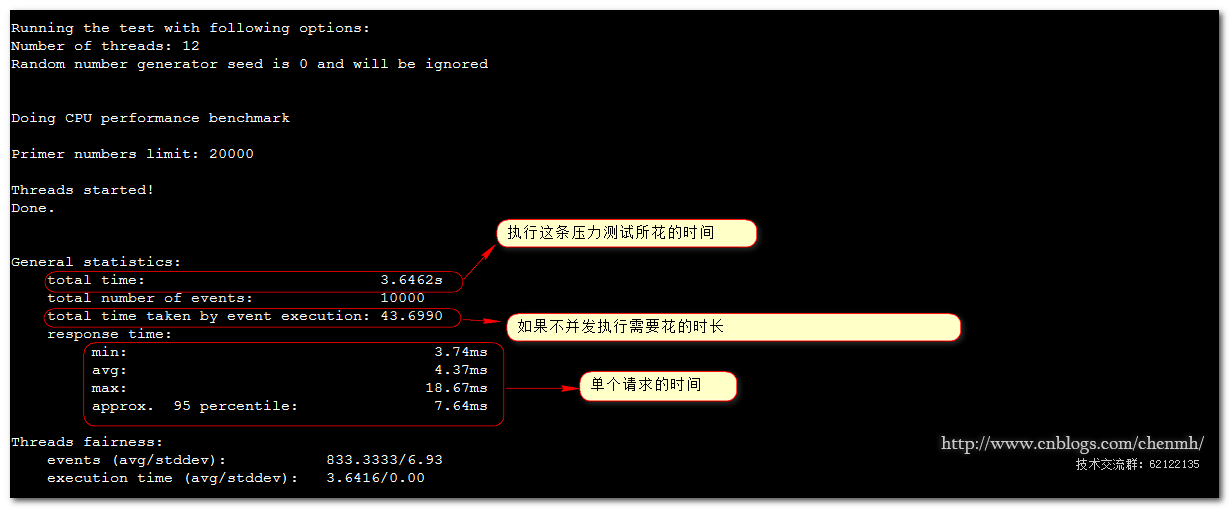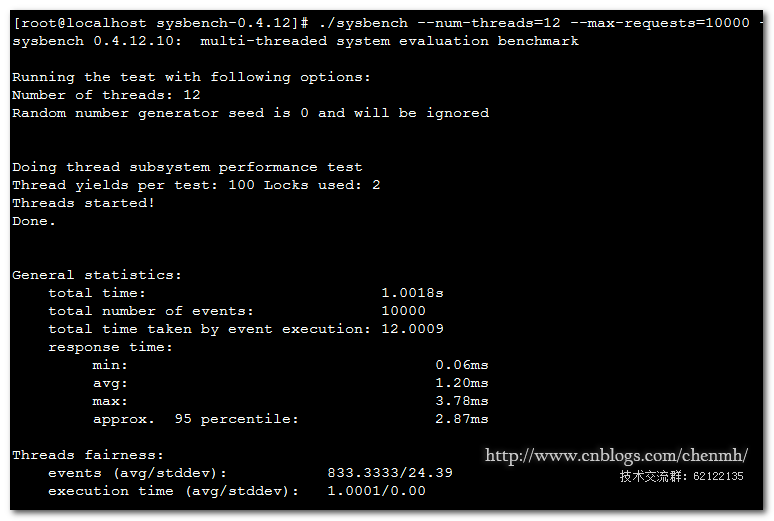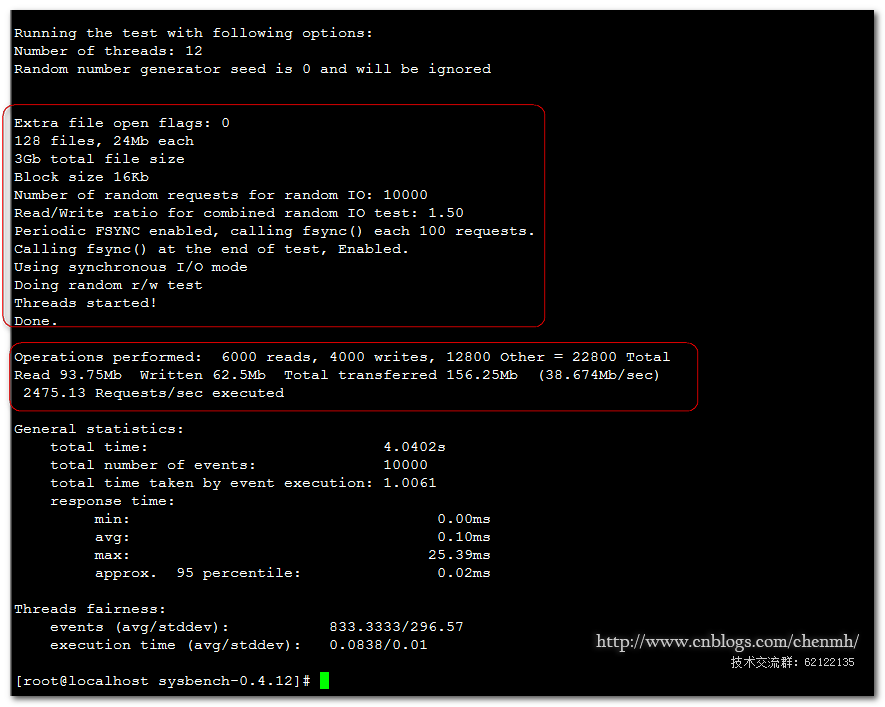sysbench 压力测试
介绍
sysbench是一个模块化、跨平台、多线程基准测试工具,主要用于测试不同系统参数下的数据库负载情况,本文主要介绍0.4版本的使用。sysbench主要用于以下性能测试:
- 文件I/O性能
- 调度
- 内存分配和传输
- POSIX线程
- 数据库
安装
下载地址:https://github.com/akopytov/sysbench/releases
1.安装插件
yum install libtool -y
2.安装
./configure --prefix=/usr/local/sysbench-0.4.12 --with-mysql-includes=/usr/local/mysql/include --with-mysql-libs=/usr/local/mysql/lib make make install cp -r sysbench/tests /usr/local/sysbench-0.4.12 ln -s /usr/local/sysbench-0.4.12/bin/sysbench /usr/local/sysbench-0.4.12/sysbench
修改环境变量,在环境变量中加入
export LD_LIBRARY_PATH=/usr/local/mysql/lib
注意:如果安装目录中没有configure那么需要执行以下操作:
chmod +x autogen.sh
./autogen.sh
如果想要让 sysbench 支持 oracle /pgsql 的话,就需要在编译的时候加上参数
--with-oracle
或者
--with-pgsql
一般语法
prepare:用于文件IO和数据库OLTP测试的数据准备阶段。
run:性能测试阶段
cleanup:移除测试过程中产生的数据
help:显示帮助信息,获取--test帮助可以使用--test=name --help
通用命令选项
这部分命令参数的通用的,不管--test测试什么内容都可以使用这些通用的命令。可以执行sysbench --help了解各参数的具体解释
General options: --num-threads=N number of threads to use [1] --max-requests=N limit for total number of requests [10000] --max-time=N limit for total execution time in seconds [0] --forced-shutdown=STRING amount of time to wait after --max-time before forcing shutdown [off] --thread-stack-size=SIZE size of stack per thread [32K] --init-rng=[on|off] initialize random number generator [off] --seed-rng=N seed for random number generator, ignored when 0 [0] --tx-rate=N target transaction rate (tps) [0] --tx-jitter=N target transaction variation, in microseconds [0] --report-interval=N periodically report intermediate statistics with a specified interval in seconds. 0 disables intermediate reports [0] --report-checkpoints=[LIST,...]dump full statistics and reset all counters at specified points in time. The argument is a list of comma-separated values representing the amount of time in seconds elapsed from start of test when report checkpoint(s) must be performed. Report checkpoints are off by default. [] --test=STRING test to run --debug=[on|off] print more debugging info [off] --validate=[on|off] perform validation checks where possible [off] --help=[on|off] print help and exit --version=[on|off] print version and exit Log options: --verbosity=N verbosity level {5 - debug, 0 - only critical messages} [4] --percentile=N percentile rank of query response times to count [95] Compiled-in tests: fileio - File I/O test cpu - CPU performance test memory - Memory functions speed test threads - Threads subsystem performance test mutex - Mutex performance test oltp - OLTP test Commands: prepare run cleanup help version See 'sysbench --test=<name> help' for a list of options for each test.
主要的参数有:
--num-threads、
--max-requests、
--test
以下几个参数也经常会使用:
--max-time 最大的测试时长
--debug(开启debug可以显示更详细的每个线程的执行情况)
CPU测试
对CPU的性能测试通常有:1. 通过算质数;2计算圆周率等;sysbench使用的就是通过质数相加的测试。对CPU测试直接运行run即可
./sysbench --num-threads=12 --max-requests=10000 --debug=on --test=cpu --cpu-max-prime=20000 run
上面的测试是:12个线程执行1万条请求,每个请求执行质数相加到20000

thread测试
测试线程调度的性能,用于高负载下的线程性能测试。
--thread-yields=N 每个请求执行“lock/yield/unlock”循环的次数,默认1000
--thread-locks=N 每个线程的互斥锁,默认8个
./sysbench --num-threads=12 --max-requests=10000 --test=threads --thread-yields=100 --thread-locks=2 run

memory测试
内存分配测试,主要是针对不同的块大小进行内存的连续读写或者随机读写测试。
memory options:
--memory-block-size=SIZE size of memory block for test [1K] --memory-total-size=SIZE total size of data to transfer [100G] --memory-scope=STRING memory access scope {global,local} [global] --memory-hugetlb=[on|off] allocate memory from HugeTLB pool [off] --memory-oper=STRING type of memory operations {read, write, none} [write] --memory-access-mode=STRING memory access mode {seq,rnd} [seq]
1.8k顺序分配
./sysbench --num-threads=12 --max-requests=10000 --test=memory --memory-block-size=8K --memory-total-size=100G --memory-access-mode=seq run

[root@localhost sysbench-0.4.12]# ./sysbench --num-threads=12 --max-requests=10000 --test=memory --memory-block-size=8K --memory-total-size=100G --memory-access-mode=seq run sysbench 0.4.12.10: multi-threaded system evaluation benchmark Running the test with following options: Number of threads: 12 Random number generator seed is 0 and will be ignored Doing memory operations speed test Memory block size: 8K Memory transfer size: 102400M Memory operations type: write Memory scope type: global Threads started! Done. Operations performed: 13107200 (993893.95 ops/sec) 102400.00 MB transferred (7764.80 MB/sec) General statistics: total time: 13.1877s total number of events: 13107200 total time taken by event execution: 91.9173 response time: min: 0.00ms avg: 0.01ms max: 0.93ms approx. 95 percentile: 0.02ms Threads fairness: events (avg/stddev): 1092266.6667/4629.30 execution time (avg/stddev): 7.6598/0.02
报告:时间13S,7.7G/S
2.8k随机分配
./sysbench --num-threads=12 --max-requests=10000 --test=memory --memory-block-size=8K --memory-total-size=100G --memory-access-mode=rnd run

[root@localhost sysbench-0.4.12]# ./sysbench --num-threads=12 --max-requests=10000 --test=memory --memory-block-size=8K --memory-total-size=100G --memory-access-mode=rnd run sysbench 0.4.12.10: multi-threaded system evaluation benchmark Running the test with following options: Number of threads: 12 Random number generator seed is 0 and will be ignored Doing memory operations speed test Memory block size: 8K Memory transfer size: 102400M Memory operations type: write Memory scope type: global Threads started! Done. Operations performed: 13107200 (1036066.63 ops/sec) 102400.00 MB transferred (8094.27 MB/sec) General statistics: total time: 12.6509s total number of events: 13107200 total time taken by event execution: 71.5377 response time: min: 0.00ms avg: 0.01ms max: 0.90ms approx. 95 percentile: 0.02ms Threads fairness: events (avg/stddev): 1092266.6667/19850.15 execution time (avg/stddev): 5.9615/0.02
报告:12.6S,8G/s
3.16K顺序分配
./sysbench --num-threads=12 --max-requests=10000 --test=memory --memory-block-size=16K --memory-total-size=100G --memory-access-mode=seq run

[root@localhost sysbench-0.4.12]# ./sysbench --num-threads=12 --max-requests=10000 --test=memory --memory-block-size=16K --memory-total-size=100G --memory-access-mode=seq run sysbench 0.4.12.10: multi-threaded system evaluation benchmark Running the test with following options: Number of threads: 12 Random number generator seed is 0 and will be ignored Doing memory operations speed test Memory block size: 16K Memory transfer size: 102400M Memory operations type: write Memory scope type: global Threads started! Done. Operations performed: 6553600 (832528.85 ops/sec) 102400.00 MB transferred (13008.26 MB/sec) General statistics: total time: 7.8719s total number of events: 6553600 total time taken by event execution: 63.7133 response time: min: 0.00ms avg: 0.01ms max: 0.90ms approx. 95 percentile: 0.02ms Threads fairness: events (avg/stddev): 546133.3333/1321.35 execution time (avg/stddev): 5.3094/0.01
报告:7S,13G/S
4.16K随机分配
./sysbench --num-threads=12 --max-requests=10000 --test=memory --memory-block-size=16K --memory-total-size=100G --memory-access-mode=rnd run

[root@localhost sysbench-0.4.12]# ./sysbench --num-threads=12 --max-requests=10000 --test=memory --memory-block-size=16K --memory-total-size=100G --memory-access-mode=rnd run sysbench 0.4.12.10: multi-threaded system evaluation benchmark Running the test with following options: Number of threads: 12 Random number generator seed is 0 and will be ignored Doing memory operations speed test Memory block size: 16K Memory transfer size: 102400M Memory operations type: write Memory scope type: global Threads started! Done. Operations performed: 6553600 (1018696.38 ops/sec) 102400.00 MB transferred (15917.13 MB/sec) General statistics: total time: 6.4333s total number of events: 6553600 total time taken by event execution: 36.1789 response time: min: 0.00ms avg: 0.01ms max: 0.88ms approx. 95 percentile: 0.02ms Threads fairness: events (avg/stddev): 546133.3333/5577.58 execution time (avg/stddev): 3.0149/0.01 [root@localhost sysbench-0.4.12]#
报告:6.4S,15G/s
总结:对于分配同样大小的内存,块月大分配的速率越快,随机分配比顺序分配的速度要快
文件io测试
./sysbench --test=fileio help
文件IO的测试主要用于测试IO的负载性能。主要的测试选项为--file-test-mode。还有几个可以关注的参数包括--file-block-size、--file-io-mode、--file-fsync-freq 、--file-rw-ratio
--file-num=N 创建测试文件的数量,默认128个 --file-block-size=N block size大小,默认16K --file-total-size=SIZE 所有文件的总大小,默认2G --file-test-mode=STRING 测试类型 {seqwr(顺序写), seqrewr(顺序读写), seqrd(顺序读), rndrd(随机读), rndwr(随机写), rndrw(随机读写)} --file-io-mode=STRING I/O模式,需要系统支持默认sync[sync(同步IO),async(异步IO),mmap()] --file-async-backlog=N 每个线程的异步操作队列数,默认128个,需要--file-io-mode=async; --file-extra-flags=STRING additional flags to use on opening files {sync,dsync,direct} [] --file-fsync-freq=N 当请求数达到多少时执行fsync()刷新,默认100,0代表过程中不执行fsync() --file-fsync-all=[on|off] 执行每一个写操作后执行fsync()刷新操作,默认关闭off --file-fsync-end=[on|off] 测试结束执行fsync()操作,默认开启on --file-fsync-mode=STRING 同步刷新方法,默认fsync {fsync, fdatasync} --file-merged-requests=N 合并指定数量的IO请求,0代表不合并,默认0 --file-rw-ratio=N 读写比例,默认1.5/1
./sysbench --num-threads=12 --max-requests=10000 --test=fileio --file-total-size=3G --file-test-mode=rndrw prepare ./sysbench --num-threads=12 --max-requests=10000 --test=fileio --file-total-size=3G --file-test-mode=rndrw run ./sysbench --num-threads=12 --max-requests=10000 --test=fileio --file-total-size=3G --file-test-mode=rndrw clean

注意:如果要对比两台服务器的io性能,需要跑相同的线程。
互斥锁测试
互斥锁测试模拟所有线程在同一时刻并发运行
./sysbench --num-threads=12 --test=mutex --mutex-num=1024 --mutex-locks=10000 --mutex-loops=10000 run
[root@localhost sysbench-0.4.12]# ./sysbench --num-threads=12 --test=mutex --mutex-num=1024 --mutex-locks=10000 --mutex-loops=10000 run sysbench 0.4.12.10: multi-threaded system evaluation benchmark Running the test with following options: Number of threads: 12 Random number generator seed is 0 and will be ignored Doing mutex performance test Threads started! Done. General statistics: total time: 0.0869s total number of events: 12 total time taken by event execution: 1.0301 response time: min: 83.86ms avg: 85.84ms max: 86.88ms approx. 95 percentile: 86.78ms Threads fairness: events (avg/stddev): 1.0000/0.00 execution time (avg/stddev): 0.0858/0.00
oltp测试
oltp是针对数据库的基准测试,例如每次对数据库进行优化后执行基准测试来测试不同的配置的tps。可以通过以下命令了解它的有关参数:
./sysbench --test=oltp help
--oltp-test-mode=STRING 测试类型:simple(简单select测试),complex(事务测试),nontrx(非事务测试),sp(存储过程) ;默认complex --oltp-reconnect-mode=STRING 连接类型:session(每个线程到测试结束不重新连接),transaction(执行每个事务重新连接),query(每一个查询重新连接),random(随机);默认 [session] --oltp-sp-name=STRING 指定执行测试的存储过程名 --oltp-read-only=[on|off] 仅执行select测试,默认关闭 --oltp-avoid-deadlocks=[on|off] 更新过程中忽略死锁,默认[off] --oltp-skip-trx=[on|off] 语句以bigin/commit开始结尾,默认[off] --oltp-range-size=N 范围查询的范围大小,默认 [100],例如begin 100 and 200 --oltp-point-selects=N 单个事务中select查询的数量,默认 [10] --oltp-use-in-statement=N 每个查询中主键查找(in 10个值)的数量,默认 [0] --oltp-simple-ranges=N 单个事务中执行范围查询的数量(SELECT c FROM sbtest WHERE id BETWEEN N AND M),默认[1] --oltp-sum-ranges=N 单个事务中执行范围sum查询的数量,默认 [1] --oltp-order-ranges=N 单个事务中执行范围order by查询的数量,默认[1] --oltp-distinct-ranges=N 单个事务中执行范围distinct查询的数量,默认[1] --oltp-index-updates=N 单个事务中执行索引更新的操作的数量,默认[1] --oltp-non-index-updates=N 单个事务中执行非索引更新操作的数量,默认[1] --oltp-nontrx-mode=STRING 指定单独非事务测试类型进行测试,默认select {select, update_key, update_nokey, insert, delete} [select] --oltp-auto-inc=[on|off] id列默认自增,默认[on] --oltp-connect-delay=N 指定每一次重新连接延时的时长,默认1秒 [10000] --oltp-user-delay-min=N minimum time in microseconds to sleep after each request [0] --oltp-user-delay-max=N maximum time in microseconds to sleep after each request [0] --oltp-table-name=STRING 指定测试的表名,默认[sbtest] --oltp-table-size=N 指定表的记录大小,默认[10000] --oltp-dist-type=STRING 随机数分布状态。uniform(均匀分布)、gauss(高斯分布)、special(特殊分布),默认 [special] --oltp-dist-iter=N number of iterations used for numbers generation [12] --oltp-dist-pct=N 启用百分比特殊分布,默认 [1] --oltp-dist-res=N special 百分比[75] --oltp-point-select-mysql-handler=[on|off] Use MySQL HANDLER for point select [off] --oltp-point-select-all-cols=[on|off] select查询测试时select所有列,默认[off] --oltp-secondary=[on|off] 索引不是主键索引而是二级索引,默认[off] --oltp-num-partitions=N 指定表分区的数量,默认 [0] --oltp-num-tables=N 指定测试表的数量,默认[1] General database options: --db-driver=STRING 指定测试数据库类型,默认mysql --db-ps-mode=STRING prepared statements usage mode {auto, disable} [auto] mysql options: --mysql-host=[LIST,...] MySQL server host [localhost] --mysql-port=N MySQL server port [3306] --mysql-socket=STRING MySQL socket --mysql-user=STRING MySQL user [sbtest] --mysql-password=STRING MySQL password [] --mysql-db=STRING MySQL database name [sbtest] --mysql-table-engine=STRING storage engine to use for the test table {myisam,innodb,bdb,heap,ndbcluster,federated} [innodb] --mysql-engine-trx=STRING whether storage engine used is transactional or not {yes,no,auto} [auto] --mysql-ssl=[on|off] use SSL connections, if available in the client library [off] --myisam-max-rows=N max-rows parameter for MyISAM tables [1000000] --mysql-create-options=STRING additional options passed to CREATE TABLE []
oltp测试主要会有以下相关参数的测试,,其它相关参数默认即可,有需求也可以自定义:
--mysql-engine-trx=STRING 指定不同的存储引擎测试。 --oltp-test-mode=STRING 测试类型:simple(简单select测试),complex(事务测试),nontrx(非事务测试),sp(存储过程) ;默认complex --oltp-sp-name=STRING 指定存储过程进行语句测试 --oltp-table-size=N 指定表的记录大小,默认[10000] --oltp-num-tables=N 指定测试表的数量,默认[1]
需要先创建好测试数据库sbtest。
1.事务测试,测试12个线程执行1万条请求,10个表,每个表大小100W
./sysbench --num-threads=12 --max-requests=100000 --test=oltp --mysql-user=root --mysql-password=root --oltp-test-mode=complex --mysql-db=sbtest --oltp-table-size=1000000 --oltp-num-tables=10 prepare
./sysbench --num-threads=12 --max-requests=100000 --test=oltp --mysql-user=root --mysql-password=root --oltp-test-mode=complex --mysql-db=sbtest --oltp-table-size=1000000 --oltp-num-tables=10 run
./sysbench --num-threads=12 --max-requests=100000 --test=oltp --mysql-user=root --mysql-password=root --oltp-test-mode=complex --mysql-db=sbtest --oltp-table-size=1000000 --oltp-num-tables=10 cleanup
[root@localhost sysbench-0.4.12]# ./sysbench --num-threads=12 --max-requests=100000 --test=oltp --mysql-user=root --mysql-password=root --oltp-test-mode=complex --mysql-db=sbtest --oltp-table-size=1000000 --oltp-num-tables=10 run sysbench 0.4.12.10: multi-threaded system evaluation benchmark No DB drivers specified, using mysql Running the test with following options: Number of threads: 12 Random number generator seed is 0 and will be ignored Doing OLTP test. Running mixed OLTP test Using Special distribution (12 iterations, 1 pct of values are returned in 75 pct cases) Using "BEGIN" for starting transactions Using auto_inc on the id column Maximum number of requests for OLTP test is limited to 100000 Using 10 test tables Threads started! Done. OLTP test statistics: queries performed: read: 1400910 write: 500325 other: 200130 total: 2101365 transactions: 100065 (791.94 per sec.) deadlocks: 0 (0.00 per sec.) read/write requests: 1901235 (15046.89 per sec.) other operations: 200130 (1583.88 per sec.) General statistics: total time: 126.3540s total number of events: 100065 total time taken by event execution: 1513.9202 response time: min: 5.82ms avg: 15.13ms max: 2352.66ms approx. 95 percentile: 18.00ms Threads fairness: events (avg/stddev): 8338.7500/207.
报告:执行当前测试花费126S,TPS:791/S,RQ:15046/S,95%的请求花费18毫秒
事务测试,每个事务包含如下语句:
Point queries: SELECT c FROM sbtest WHERE id= N Range queries: SELECT c FROM sbtest WHERE id BETWEEN N AND M Range SUM() queries: SELECT SUM(K) FROM sbtest WHERE id BETWEEN N and M Range ORDER BY queries: SELECT c FROM sbtest WHERE id between N and M ORDER BY c Range DISTINCT queries: SELECT DISTINCT c FROM sbtest WHERE id BETWEEN N and M ORDER BY c UPDATEs on index column: UPDATE sbtest SET k=k+1 WHERE id= N UPDATEs on non-index column: UPDATE sbtest SET c= N WHERE id= M DELETE queries: DELETE FROM sbtest WHERE id= N INSERT queries: INSERT INTO sbtest VALUES ( ...
非事务测试,执行语句如下
Point queries: SELECT pad FROM sbtest WHERE id= N UPDATEs on index column: UPDATE sbtest SET k=k+1 WHERE id= N UPDATEs on non-index column: UPDATE sbtest SET c= N WHERE id= M DELETE queries: DELETE FROM sbtest WHERE id= N The generated row IDs are unique over each test run, so no row is deleted twice. INSERT queries: INSERT INTO sbtest (k, c, pad) VALUES( N , M , S )
总结
sysbench是使用最广泛的基准压测工具,功能也很齐全报告也非常的详细。
|
备注: 作者:pursuer.chen 博客:http://www.cnblogs.com/chenmh 本站点所有随笔都是原创,欢迎大家转载;但转载时必须注明文章来源,且在文章开头明显处给明链接。 《欢迎交流讨论》 |





【推荐】国内首个AI IDE,深度理解中文开发场景,立即下载体验Trae
【推荐】编程新体验,更懂你的AI,立即体验豆包MarsCode编程助手
【推荐】抖音旗下AI助手豆包,你的智能百科全书,全免费不限次数
【推荐】轻量又高性能的 SSH 工具 IShell:AI 加持,快人一步